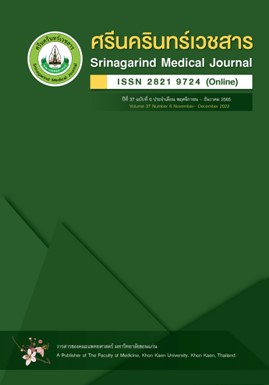Correlation between Craniovertebral Angle and Balance Ability in Forward Head Posture
Keywords:
craniovertebral angle, balance ability, forward head postureAbstract
Background and objective: As a result of a poor forward head posture, the upper cervical spine is stretched and the lower cervical spine is bent, causing a loss of balance to the body, neck pain, shortening of the neck muscles and deep neck muscle weakness. The objective of this study was to observe the relationship between the forward angle of the neck (craniovertebral angle; CVA) and balance through the functional reach test (FRT) in healthy subjects with a forward head posture.
Methods: The relationship between CVA and FRT test was examined in 26 volunteers.
Results: The correlation between CVA and FRT demonstrated a correlation coefficient of 0.23, which presented no statistically significant correlation (p = 0.25).
Conclusion: The correlation between CVA and FRT was low, with no correlation between protruding neck angle and posture ability as observed via the FRT test in healthy individuals.
References
Grimmer-Somers K, Milanese S, Louw Q. Measurement of cervical posture in the sagittal Plane. J Manipulative Physiol Ther 2008;31(7):509-17.
Yip CH, Chiu TT, Poon AT. The relationship between head posture and severity and disability of patients with neck pain. Man Ther 2008;13(2):148-54.
Mousavi-khatir R, Talebian S, Maroufi N, Olyaie G. Effect of static neck flexion in cervical flexion-relaxation phenomenon in healthy males and females. J Bodyw Mov Ther 2015;20(2):235-42.
Koseki T, Kakizaki F, Hayashi S, Nishida N, Itoh M. Effect of forward head posture on thoracic shape and respiratory function. J Phys Ther Sci 2019;31(1):63-8.
Hazar Z, Karabicak GO, Tiftikci U. Reliability of photographic posture analysis of adolescents. J Phys Ther Sci 2015;27(10):3123-6.
Szeto GP, Straker L, Raine S. A field comparison of neck and shoulder postures in symptomatic and asymptomatic office workers. Appl Ergon 2002;33(1):75–84.
Jacobs JV, Dimitrova DM, Nutt JG, Horak FB. Can stooped posture explain multidirectional postural instability in patients with Parkinson’s disease. Exp Brain Res. 2005;166(1):78–88.
Agrawal Y, Carey JP, Hoffman HJ, Sklare DA, Schubert MC. The modified romberg balance test: normative data in US adults. Otol Neurotol 2011;32(8):1309–11.
Berg K, Wood-Dauphinne´e S, Williams JI, Gayton D. Measuring balance in the elderly: Preliminary development of an instrument. Physiother Can 1989;41(6):304–11.
Bohannon RW. Reference values for the timed up and go test: a descriptive metaanalysis. J Geriatr Phys Ther 2006;29(2):64-8.
Duncan PW, Weiner DK, Chandler J, Studenski S. Functional reach: a new clinical measure of balance. J Gerontol 1990;45(6):192-7.
King MB, Judge JO, Wolfson L. Functional base of support decreases with age. J Gerontol 1994;49(6): 258-63.
Weiner DK, Duncan PW, Chandler J, Studenski SA. Functional reach: a marker of physical frailty. J Am Geriatr Soc 1992;40(3):203–7.
Horak B, Shupert L, Mirka A. Components of postural dyscontrol in the elderly: a review Neurobiol Aging 1989;10(6):727-38.
Kang JH, Park RY, Lee SJ, Kim JY, Yoon SR, Jung KI. The effect of the forward head posture on postural balance in long time computer based worker. Ann Rehabil Med 2012;36(1):98-104.
Jirawattanakul A. Statistic for health science research. Bankok: Khon Kaen University; 2004.
Jantoon N, Uthaikhup S. Forward head posture does not affect sensorimotor function in healthy university students. Thai J Phys Ther 2021;43(1):22-30.
Lee JH. Effects of forward head posture on static and dynamic balance control. J Phys Ther Sci 2016;28(1):274–7.
Downloads
Published
How to Cite
Issue
Section
License
Copyright (c) 2022 Srinagarind Medical Journal

This work is licensed under a Creative Commons Attribution-NonCommercial-NoDerivatives 4.0 International License.




